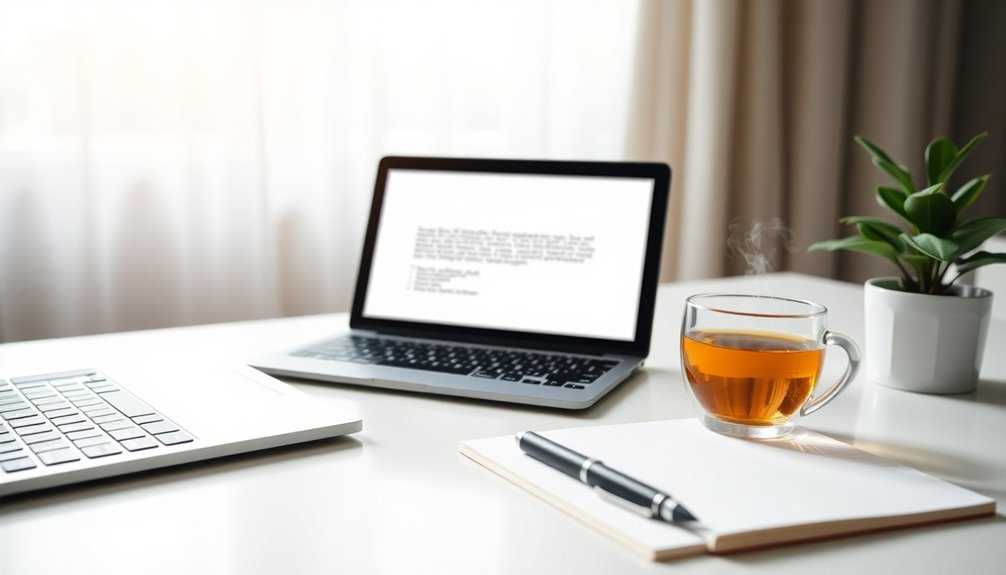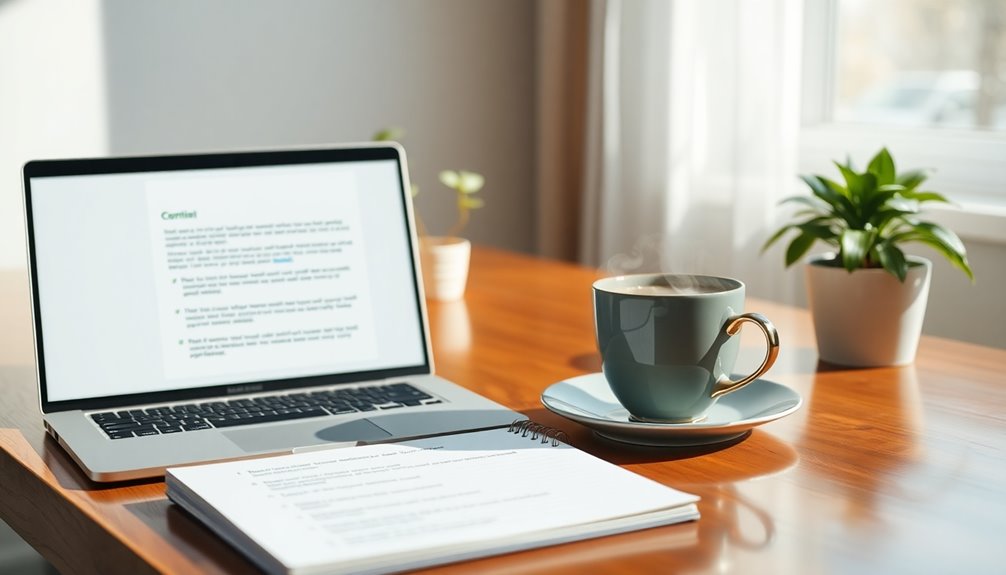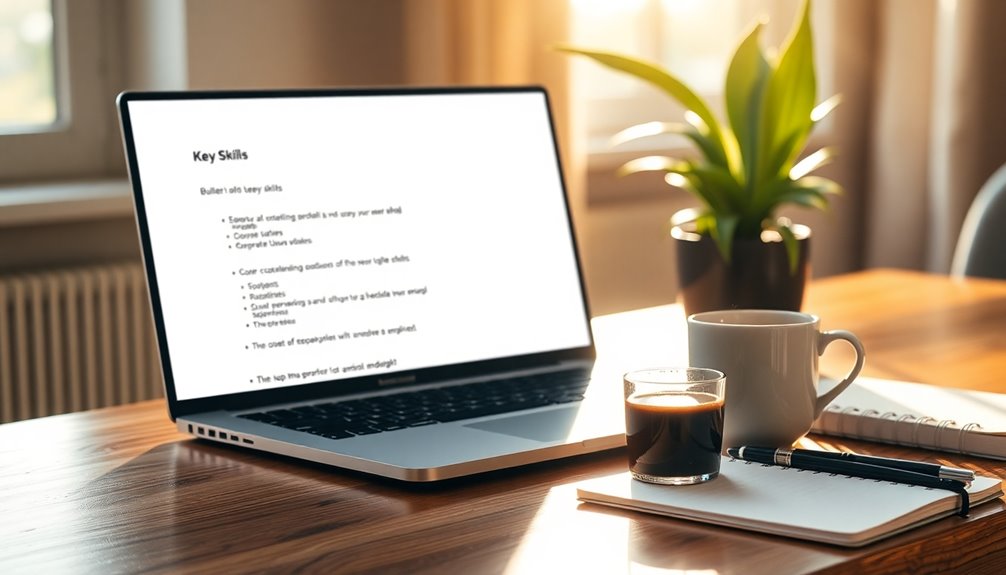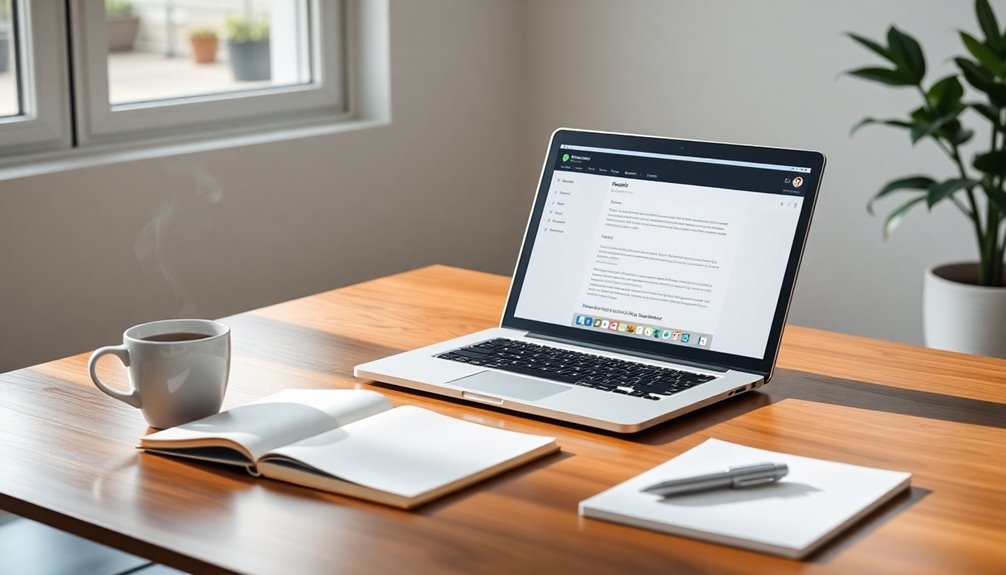To write an effective email to your counselor, start with a clear subject line that summarizes your request. Begin with a polite greeting and introduce yourself if necessary. Clearly state your purpose, whether it's scheduling a meeting or asking for guidance on a specific issue. Keep your email concise, using short paragraphs to enhance readability. Don't forget to emphasize any important deadlines and express gratitude for their help. Using the right tone can set a positive atmosphere. If you follow these tips, you'll soon discover more ways to make your communication even more effective!
Key Takeaways
- Use a specific subject line that clearly reflects your request, such as "Request for College Application Guidance."
- Start with a polite greeting and briefly state the purpose of your email.
- Organize your email into short paragraphs, making it easy to read and comprehend.
- Highlight important deadlines and required documents to ensure clarity.
- Close with a professional sign-off, expressing gratitude and requesting confirmation of receipt.
Introduction

When reaching out to a counselor, crafting a well-structured email is essential for effective communication. A clear and informative subject line is your first step in grabbing their attention. Make sure it's specific and highlights your main point, like "College Applications" or "Academic Concerns." This helps the counselor quickly understand the topic at hand.
Begin your email with a formal salutation, such as "Dear Mr./Ms. [Last Name]," to set a professional tone. Right after the greeting, briefly state your purpose. This clarity allows the counselor to grasp your request without sifting through lengthy explanations. Additionally, remember to maintain a professional tone throughout your email to foster respect and understanding. Clearly articulate your main request or concern in a concise manner, ensuring your email remains focused and easy to read. Avoid unnecessary jargon or overly casual language to uphold a sense of professionalism. If applicable, you may also reference prior communication, such as a thank you email after interview, to provide context and make your message more cohesive.
Use concise paragraphs to keep your email organized and easy to read. If you need assistance, be direct about what you're looking for. Whether it's information about a specific college, an application deadline, or a scholarship, include relevant details.
If you want to schedule a meeting, suggest a few options and indicate whether it can be virtual or in-person.
Builds Trust and Rapport

If you need specific help or wish to request a meeting, state that clearly. Offering flexibility with your schedule shows you're considerate of their availability. Organizing your thoughts into distinct paragraphs enhances readability, making it easier for your counselor to understand your needs. Additionally, demonstrating your knowledge about the admissions process can help convey your seriousness about your application.
Clear Subject Line

A clear subject line is essential for ensuring your counselor understands the purpose of your email at a glance. Keep it short—aim for 50 characters or fewer. This helps your counselor quickly grasp your message without sifting through unnecessary details.
Avoid vagueness; instead, clearly state your main point to save them time and effort. Incorporate strong verbs to clarify what you need from them, like "Request a Meeting" or "Update on Progress." Adding pertinent details directly in the subject line can provide immediate context, making it easier for them to respond effectively.
Tailor your subject line to a specific topic your counselor cares about, and make it personal by referencing previous conversations or their name. This shows you value their time and input. Attention-grabbing subject lines can also create a sense of urgency. Use phrases like "Join Our Upcoming Workshop" or "Immediate Assistance Needed." Aim to provoke curiosity with questions or list-based subject lines, such as "Top Strategies for Stress Management."
Step-by-Step Guide to Writing Requests

Effective communication is key when writing requests to your counselor. Start your email with a formal salutation like "Dear Mr./Ms. [Last Name]." Address your counselor respectfully, using their title and last name, and maintain a professional tone throughout your message.
In the body of your email, briefly state your purpose right away. Provide relevant context to clarify your request, ensuring the message remains concise and informative. Clarity in the main message is essential for effective communication.
Use separate paragraphs to organize your thoughts and highlight important details, such as due dates or specific needs.
When requesting a meeting or response, clearly express what you want—whether it's a meeting or specific information. Offer available dates and times for a meeting, showing your flexibility. Specify if the meeting can be virtual or in-person, depending on school policies. Mention any additional resources you might need during the meeting, too.
Close your email by thanking your counselor for their time and assistance. Use a professional closing phrase like "Sincerely" or "Best regards," and include your full name, graduation year, and contact information.
Dos and Don'ts for Counselor Emails
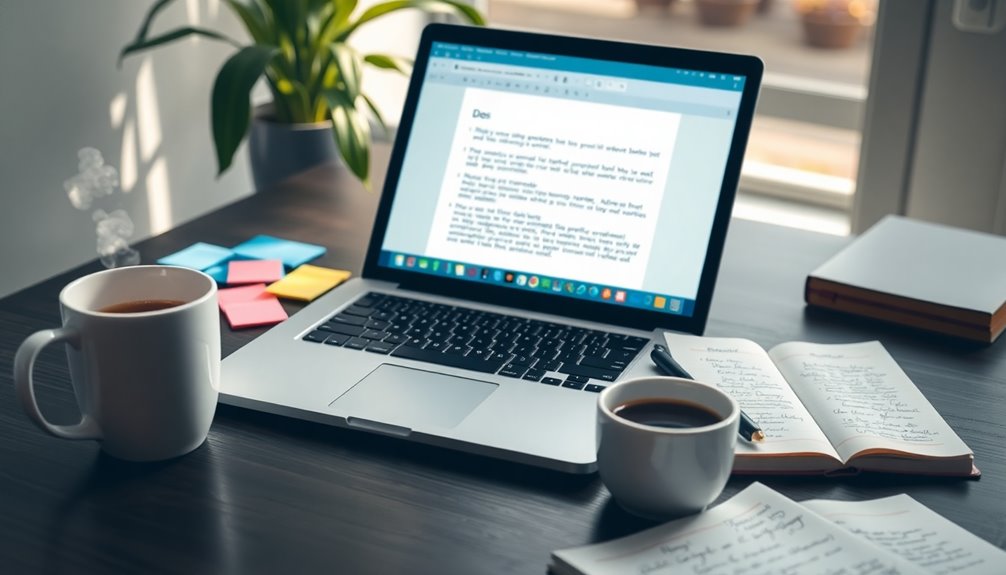
When communicating with your counselor, it's essential to follow certain dos and don'ts to ensure your email is received positively.
First, use a formal tone throughout your message. Address your counselor with the appropriate title, like "Dear Mr./Ms./Dr." and close with a polite sign-off such as "Best regards" or "Sincerely." Additionally, including a professional email address enhances your credibility in academic communications.
Craft a clear subject line that succinctly states the purpose of your email; avoid vague or blank lines.
Make sure to edit and proofread your email carefully. Check for grammar, spelling, and clarity by reading it aloud.
On the other hand, don't use unprofessional email addresses like "Cute_Puppy"—stick to something that includes your name.
Avoid informal language and humor, as it can be easily misinterpreted. Rudeness is a no-go; always be respectful and courteous.
Lastly, keep your email concise. Don't overwhelm your counselor with lengthy narratives or lists of questions. Use classic fonts and standard sizes for easy reading.
Sample Request Emails

Don't forget to include any relevant details, such as application deadlines or scholarships. It's also helpful to express appreciation for their guidance. Additionally, remember that email is an effective way for reaching individuals who may be hard to contact by phone. End with a polite closing like "Sincerely," followed by your full name, graduation year, and contact information. This approach makes it easy for your counselor to respond and assist you effectively.
Pro Tips for Writing Effective Emails
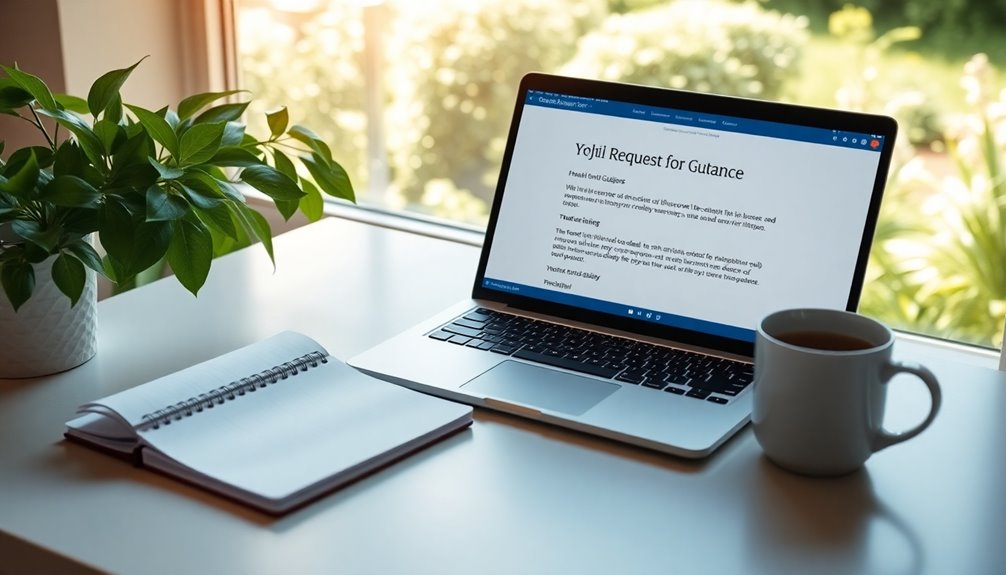
Check your tone to ensure it's friendly and professional.
Be earnest, especially when reaching out for help.
Include a clear call to action, letting the counselor know what you expect from them. A well-crafted email should also eliminate unnecessary information to focus on the main idea, making it easier for the counselor to respond effectively.
Final Thoughts

Effective communication with your counselor can significantly impact your academic journey and future opportunities. When you're reaching out via email, professionalism is key. Start by using a formal tone and addressing your counselor correctly, like "Dear Mr./Ms. [Last Name]."
Steer clear of unprofessional email addresses, and always proofread for errors to ensure clarity. Additionally, ensure that your email follows a proper email structure to enhance its effectiveness. Utilizing Intelligent Tutoring Systems (ITS) can also help you refine your communication skills. Recognizing patterns of emotional coldness in your communication style can also be beneficial for building rapport with your counselor. A strong growth mindset can also empower you to engage more openly and effectively.
Next, provide clear context for your request. Briefly state the purpose of your email and include relevant details—this might be about specific colleges, deadlines, or scholarships. Energy-efficient technology can also be a topic to discuss if it's relevant to your academic goals.
Use paragraphs for better readability, and don't forget to highlight any critical information, like due dates.
If you need to schedule a meeting, suggest specific dates and times while remaining flexible. Indicate whether you prefer a virtual or in-person meeting, and clearly state what you hope to achieve from the conversation.
Frequently Asked Questions
What Is the Best Time to Send an Email to My Counselor?
If you're wondering when to send an email to your counselor, aim for midweek—Tuesday or Thursday are your best bets.
Try to send it around 10 a.m. or 1 p.m., as these times have shown higher engagement rates.
Avoid weekends and late evenings, since response rates drop during those times.
How Long Should I Wait for a Response?
You should generally wait about 1-2 business days for a response from your counselor.
If you haven't heard back by then, it's perfectly fine to follow up with a polite reminder.
Keep in mind that counselors often juggle many emails and commitments, so delays can happen.
If it's urgent, consider calling or resending your message, just to ensure it didn't get lost in their inbox.
Can I Request a Specific Type of Counseling?
Yes, you can definitely request a specific type of counseling!
When you reach out to a counselor, just be clear about what you're looking for, like Cognitive Behavioral Therapy or Dialectical Behavioral Therapy.
It's important to express your needs and concerns, so they can match you with the right therapeutic approach.
What if My Email Is Too Long?
If your email's too long, you risk losing the reader's attention.
Start by identifying the main points you want to convey. Keep your email concise by stating your purpose right away, and break down complex ideas into simpler questions.
Use paragraphs to separate thoughts and ensure clarity. Highlight key details clearly, so the counselor understands your concerns.
How Do I Follow up if I Don't Get a Reply?
If you don't get a reply, wait about 3-5 business days before following up.
In your email, briefly restate your original request and include any new information. Keep it concise and consider changing the subject line to grab attention.
If emails aren't working, a polite phone call or in-person meeting might be more effective.
Always maintain a respectful tone and express appreciation for the counselor's time.
